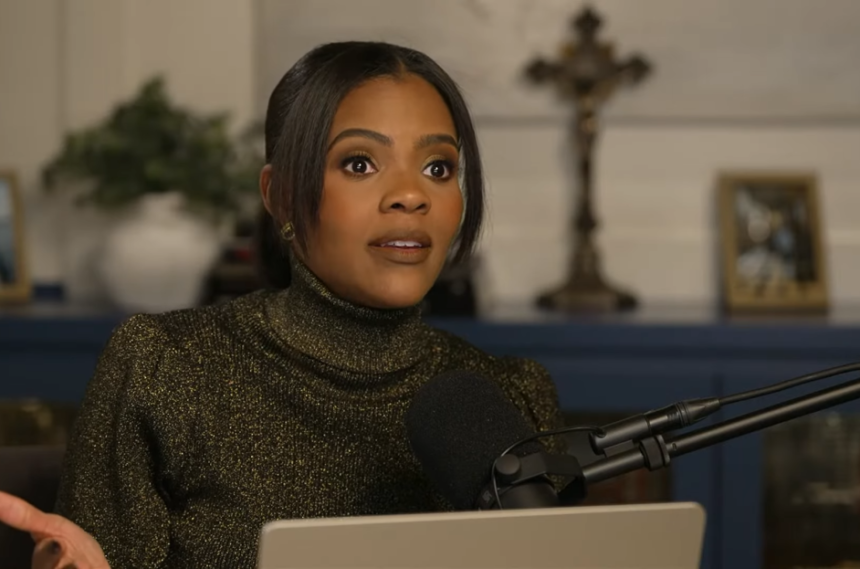In an era marked by cultural upheaval and polarized discourse, Candace Owens has emerged as a formidable voice in conservative media, championing Catholic and Christian values with unapologetic fervour.
The 36-year-old political commentator, podcaster, and author has captivated millions with her incisive commentary, leveraging her platform to confront what she perceives as anti-Christian sentiment and to advocate for traditional values.
Her recent conversion to Catholicism, her public disputes with figures associated with Zionism, her rapid rise on social media, and her roles as a wife and mother have solidified her as a polarizing yet influential figure in the fight for faith-based principles in a secular world.
A Meteoric Rise on Social Media
Candace Owens’ ascent to prominence began in 2017 when she launched her YouTube channel, “Red Pill Black,” where she posted provocative videos challenging progressive narratives on race, politics, and culture. Her bold critiques, including titles like “I Don’t Care About Charlottesville, the KKK, or White Supremacy,” garnered attention from conservative audiences and far-right figures alike, propelling her into the national spotlight.
By 2018, she had joined Turning Point USA as communications director, touring college campuses with founder Charlie Kirk to promote conservative ideas among young people. Her tenure there, though brief, amplified her visibility, with endorsements from prominent Republicans like President Donald Trump, who called her a “very smart thinker.”
Owens’ social media presence exploded, amassing over 4 million Instagram followers and 4.8 million on X by 2024. Her ability to craft viral content—sharp, confrontational, and often laced with humour—resonated with a generation disillusioned by mainstream media.
She transitioned to The Daily Wire in 2021, hosting “Candace,” a political talk show that became one of the most popular podcasts in the country. Her departure from The Daily Wire in March 2024, following tensions over her commentary on Israel and allegations of antisemitism, only fueled her independent rise. Relaunching her podcast, “Candace,” in June 2024, she quickly climbed to the top 10, proving her enduring influence.
Her social media strategy is deliberate: a mix of personal anecdotes, political hot takes, and faith-driven rhetoric. Owens’ posts often blend her roles as a commentator and a mother, sharing glimpses of her family life alongside calls to defend Christian values. This authenticity has endeared her to followers who see her as a relatable yet fearless advocate.
Conversion to Catholicism: A Spiritual Homecoming
In April 2024, Owens announced her conversion to Catholicism, a move she described as a “decision to go home.” Baptized at the Brompton Oratory in London, a bastion of traditional Catholicism, she stood alongside Father Julian Large, holding a candle in a moment that symbolized her spiritual transformation. Her conversion was not entirely unexpected, given her marriage to George Farmer, a devout Catholic and former CEO of Parler, who had converted to Catholicism while studying theology at Oxford.
Owens’ journey to Catholicism was marked by a gradual embrace of the faith. In May 2023, she hosted a theological debate on her podcast between her husband and evangelical commentator Allie Beth Stuckey, which garnered over a million views.
At the time, Owens revealed she attended Mass with Farmer and their children but was undecided on a denominational shift. By March 2024, she responded to a follower on X with “Almost there. ✝️,” signalling her imminent conversion.
Her husband’s influence was significant. Farmer, the son of a British peer, described their marriage as a “leap of faith” that deepened his own spiritual life. Owens credited his example, alongside her curiosity about Catholic theology and her disillusionment with Evangelicalism’s politicization, as catalysts for her conversion.
She told a Catholics for Catholics event in Phoenix that studying history led her to Catholicism, stating, “To become a student of history is to become a Catholic.” This perspective reflects her belief that the Catholic Church embodies a timeless truth, rooted in tradition and moral clarity.
The announcement was met with jubilation among conservative Catholics. Catholic journalist Sachin Jose quoted Scott Hahn, saying, “Welcome home, Candace Owens, dear sister-in-Christ!” Pro-life activist Abby Johnson and others echoed this sentiment, welcoming her into the fold.
However, some Black Catholics, like scholar Jalane Schmidt, urged Owens to engage with post-Vatican II teachings on antisemitism and immigration, highlighting tensions between her political stances and Catholic doctrine.
Confronting Anti-Christian Sentiment
Owens has positioned herself as a defender of Christianity against what she perceives as a global assault on the faith. In a June 2024 interview with Piers Morgan, she claimed a “Christian holocaust” is being ignored, citing the persecution of Christians in regions like Armenia, where she accused Israel of supplying arms used against Christians.
Her rhetoric often frames Christianity as under siege by secular liberalism, “wokeness,” and other forces she deems anti-Christian. This stance resonates with her audience, who see her as a bulwark against cultural erosion.
Her critiques extend to specific political and cultural issues. Owens has condemned progressive ideologies like “gentle parenting,” which she links to societal decay, and criticized the Black Lives Matter movement as divisive. She argues that these trends undermine traditional Christian values, such as personal responsibility and family structure. Her mantra, “your life is your fault,” reflects her belief in individual accountability rooted in Christian ethics.
Owens’ outspokenness has not been without controversy. Her comments on social issues, from transgender rights to same-sex marriage, have drawn accusations of bigotry. In 2022, she called The Walt Disney Company “child groomers” for opposing Florida’s “Don’t Say Gay” bill and falsely suggested the Robb Elementary School shooter was transgender. These statements, while polarizing, have cemented her as a provocateur unafraid to challenge mainstream narratives.
Clashes with Zionists and Allegations of Antisemitism
Owens’ most contentious battles have involved her critiques of Israel and allegations of antisemitism, which culminated in her exit from The Daily Wire. Her conflicts with Daily Wire co-founder Ben Shapiro, who is Jewish, began in November 2023 when she embraced the phrase “Christ is King” in posts critical of Israel’s actions in Gaza following the October 7, 2023, Hamas attack.
Shapiro called her commentary “disgraceful,” accusing her of promoting antisemitic tropes. Owens doubled down, denying antisemitism and framing her stance as a defence of Christian values.
She has accused Israel of committing “genocide” in Gaza and criticized its role in supplying arms to Azerbaijan, which she claims harms Christians in Armenia. These statements drew sharp rebukes from Jewish leaders and conservative allies like Dennis Prager, who criticized her for defending Kanye West’s antisemitic remarks.
Owens’ “just asking questions” approach—questioning Jewish influence in politics and society—has been labelled antisemitic by critics, including the Anti-Defamation League. A 2024 manifesto by Solomon Henderson, a Nashville school shooter, cited Owens as an inspiration for his antisemitic views, intensifying scrutiny of her rhetoric.
Owens maintains that her critiques are not antisemitic but rooted in her Christian faith. In her Piers Morgan interview, she argued that “Christ is King” is a “basic Christian doctrine” and accused the media of ignoring Christian persecution while amplifying Jewish suffering.
Catholic commentators, like those at First Things, have defended her conversion while rejecting her rhetoric, emphasizing that Catholic teaching condemns hatred of Jews as incompatible with Christianity. The Catechism of the Catholic Church underscores the Jewish people’s unique role in salvation history, a point Owens’ critics argue she overlooks.
Marriage, Motherhood, and the “Trad Wife” Identity
Owens’ personal life is as integral to her public persona as her political commentary. She met George Farmer in 2018 at a Turning Point UK event, and they married in 2019 at Trump Winery in Virginia, with guests like Larry Elder and Charlie Kirk in attendance. The couple has four children, born between 2021 and 2025, and their family life in Nashville reflects Owens’ embrace of the “trad wife” archetype—a term she proudly adopts.
On Instagram, Owens shares glimpses of her domestic life, from pre-dawn workouts to pantry organization, often with a defiant edge. “I cook dinner for my husband 5-7 days per week. How’s that for feminism?” she posted, challenging progressive norms.
Her rejection of “gentle parenting” and advocacy for traditional gender roles resonate with her audience, who see her as a model of conservative womanhood. Motherhood, she says, has hardened her resolve to protect Christian values for her children’s future.
A farmer’s influence extends beyond their marriage. His conversion to Catholicism and focus on faith over politics complement Owens’ public persona. He told the Catholic Herald, “She is very outward-facing, and pretty much everything she says becomes a news story, whereas I am exclusively interested in faith.”
Their partnership reflects a shared commitment to cultural renewal through Christian principles, though Owens’ outspokenness often overshadows Farmer’s quieter approach.
A Proud Conservative Woman
As a Black conservative woman, Owens occupies a unique space in American politics. Her 2018 co-founding of BLEXIT, a movement encouraging Black Americans to leave the Democratic Party, established her as a contrarian voice. Her book, Blackout: How Black America Can Make Its Second Escape from the Democrat Plantation (2020), articulated her belief that liberal policies harm Black communities, drawing both praise and criticism.
Owens’ conservatism is rooted in her Christian faith, which she sees as a bulwark against moral relativism and cultural decay. Her critiques of “wokeness,” feminism, and progressive education align with her advocacy for family, faith, and personal responsibility. At a 2018 Liberty University speech, she shared her journey from a troubled childhood, marked by poverty, abuse, and racial threats, to rediscovering her Christian roots, framing her faith as a source of resilience.
Her public persona is unapologetic. Whether sparring with Megyn Kelly over Gaza protests or challenging COVID-19 mandates, Owens’ “fighting spirit” has won her admirers and detractors. Critics argue her rhetoric veers into extremism, citing her associations with figures like Nick Fuentes, a known antisemite. Supporters, however, see her as a courageous defender of truth, unafraid to tackle “radioactive” topics.
Navigating Controversy and Catholic Identity
Candace Owens’ conversion to Catholicism has not softened her edge but rather amplified her mission to defend Christian values. Her speech at the Catholics for Catholics event, where she received the Joan of Arc Award, framed history as a “holy war being waged against goodness.”
This rhetoric aligns with the “TradCath” (traditionalist Catholic) movement, which embraces pre-Vatican II liturgy and conservative social teachings. Yet, her alignment with this subculture has raised concerns among mainstream Catholics, who argue her views on Israel and Jews contradict the Church’s teachings on charity and respect.
The Catholic Church’s post-Vatican II emphasis on ecumenism and social justice clashes with Owens’s confrontational style. Critics like Gloria Purvis, a Black Catholic commentator, have called for her to repent of past controversial statements, reflecting broader tensions within the Church about political conservatism. Owens, however, remains undeterred, using her platform to rally conservative Catholics and Christians globally.
Conclusion
Candace Owens’ journey—from a provocative YouTuber to a Catholic convert and conservative icon—reflects a broader cultural moment. Her rise on social media, fueled by her fearless commentary, has made her a lightning rod for both admiration and criticism.
Her conversion to Catholicism, influenced by her husband and a quest for truth, has deepened her commitment to defending Christian values against what she sees as a hostile secular world. Her clashes with Zionists and accusations of antisemitism have sparked fierce debate, yet her supporters view her as a warrior for faith and tradition.
As a wife, mother, and proud conservative, Owens embodies a vision of womanhood rooted in family and faith. Her story is one of transformation and conviction, navigating personal and public battles with equal intensity.
Whether addressing a room of believers or sparring on X, Owens continues to shape the discourse around Christianity, conservatism, and culture, leaving an indelible mark on a divided world.







